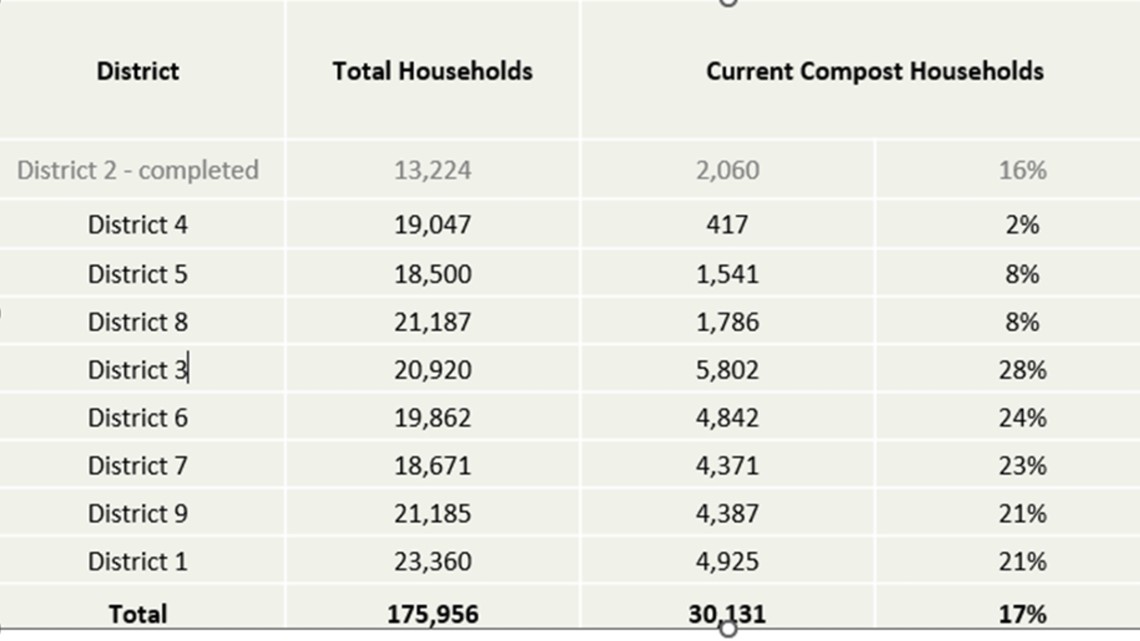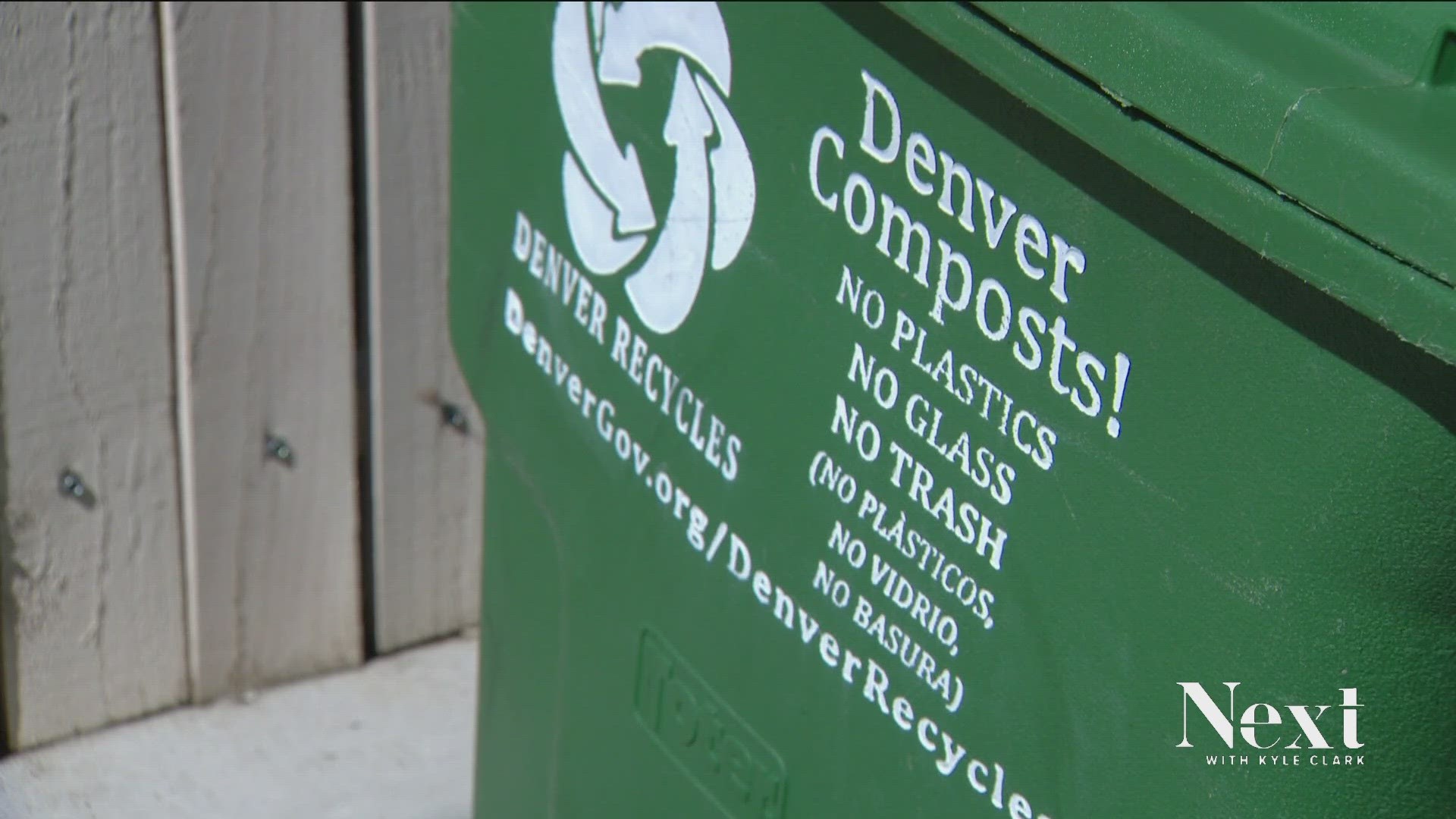DENVER — It is a good thing the leaves around Denver have not started changing yet.
Once they change colors, they start to fall off the trees, and then, you have to do yard work.
As part of a new "pay as you throw" trash program in Denver, all residents are supposed to get compost bins.
Yet most residents do not yet have compost bins.
“I love to garden and have a nice backyard and I create a lot of organic waste back here,” said Denver resident Valerie Franks.
Her yard in the Baker neighborhood is not that big, so mowing it, like she did on Tuesday, did not take much time.
“A lot of it can go in compost and it’s currently still going in the trash,” Franks said.
Just like most Denver residents, Franks does not yet have a compost bin.
“We currently get the middle-sized trash bin and I really think we could probably downsize to the smaller trash bin once we’re able to start composting,” Franks said.
When Denver started the expanded waste collection in January, residents were charged an additional fee for trash, recycling and compost.
As part of the fee-based program, residents are charged based on the size of their trash bin.
- Small 35-gallon trash cart: $9/month
- Medium 65-gallon trash cart: $13/month
- Large 95-gallon trash cart: $21/month.
Starting in January, the city started picking up recycling every week, instead of every other week, expanded large pickup collection to once a month instead of once every two months and said each resident would be provided a compost bin.
“I mean, I’m still excited, it’s just like, ‘come on now, guys,’” Franks said.
“This is our backyard that has many, many, many, many branches, trees, leaves, weeds, flowers, dead flowers that need to be deadheaded, and I have no place to put them many times,” said Denver resident Tom Johnson.
Once Denver started the "pay as you throw" program, Johnson downsized his trash bin.
“We turned it in – into a really small one – thinking we were going to get a compost bin,” Johnson said.
He does not have that compost bin yet.
“Our neighbor has the thing, and if he has room, he lets me put stuff in it, but I look like a cheap skate with this teensy trash can,” Johnson said.
Based on statistics from the Denver Department of Transportation and Infrastructure (DOTI), one-in-five households in southeast Denver had a compost bin prior to this year, when trash pickup was covered by property tax dollars and compost was an extra fee.
DOTI has divided the city into nine solid waste collection districts, and so far, only one district has received compost bins. That would be District Two, from City Park north to Five Points and Globeville, Elyria Swansea.
“I’m just wondering why, how they chose which districts to get first, second, third and stuff like that,” Johnson said.
“We don’t want to just drop off 150,000 carts and say, ‘OK, figure out what goes in there.’ It’s a new service for a lot of people,” said Nina Waysdorf, DOTI’s waste diversion and recycling manager. “We do need to be very hands on with the rollout process. It has to be methodical. It has to be thoughtful. It has to be patient.”
Tuesday was solid waste collection day for the City Park neighborhood, where Waysdorf spent part of her morning lifting cart lids and auditing people’s use of recycling and compost bins.
“We’re checking for contamination, and then if we find it, we’re educating the residents, we’re leaving a tag so they know what was in the wrong cart, you know, it’s an educational tool,” Waysdorf said. “And then we’re turning it around so that the driver doesn’t collect a contaminated cart.”
That means some residents who put their carts out at the curb or in the alley will find those carts still full, with a paper tag attached explaining why it was not emptied.
“This one we tagged earlier. We found there was a bag of dog poop in there,” Waysdorf said. “We don’t take pet waste in our compost or recycling carts.”
The need to educate residents is why only 41,000 have compost bins out of 176,000 households.
“All of the hard work that residents are doing to compost correctly could be for naught because if there’s too much contamination, then our loads will get rejected,” Waysdorf said. “For compost, we want food scraps, yard trimmings When we’re seeing things like trash, paper products, recyclables, those are things we want to educate on.”
DOTI plans to deliver its next set of compost bins to solid waste collection District Four to Montbello, Gateway and Green Valley Ranch in northeast Denver.
Based on the rollout plan, it will be more than a year before everyone gets their compost bin.
“We feel like we can do about one district per quarter. Starting in the new year, that would take us through 2025 to get through the remaining eight districts,” Waysdorf said.
Based on statistics provided by DOTI, northeast Denver had the lowest participation for compost bins when they were an added fee prior to this year.


“That area has very low compost numbers, so that’s a big priority,” Waysdorf said.
DOTI estimates that District 8 – west Denver – and District 3 – southwest Denver – will be next. Those also have low compost numbers from the previous compost program.
“Everybody who doesn’t currently have compost is still getting a phased service rollout credit on their invoice. So, $3 a month off on their bill until compost starts in their neighborhood,” Waysdorf said.
“I don’t really care so much about the money as I care about the convenience,” Johnson said.
Johnson, who lives in solid waste collection District Nine had an idea that instead of sizing down trash cans, residents should be able to keep the larger trash bin with some sort of marking that indicates can be used for compost in the interim.
“I thought, well, why couldn’t they just recycle some of the big trash cans, like put a green stripe on it or put a green top on it or something, in lieu of the compost bins until we get them,” Johnson said.
Waysdorf explained why that is not an option.
“Because we also have to grow our routes,” Waysdorf said. “We may not have a route built to encompass all of the people doing that.”
SUGGESTED VIDEOS: Full Episodes of Next with Kyle Clark

